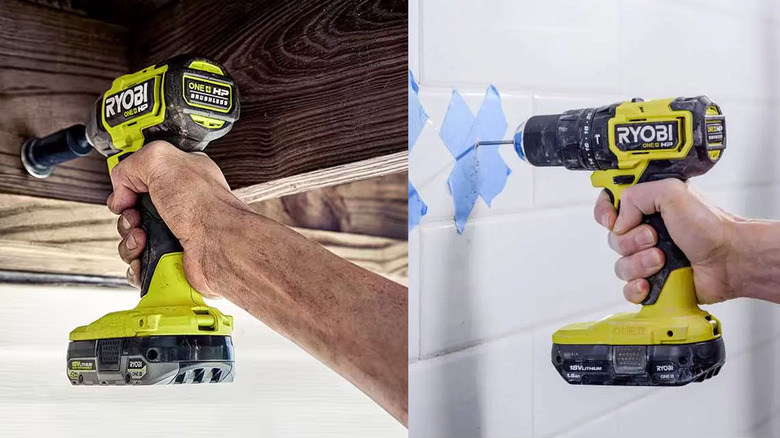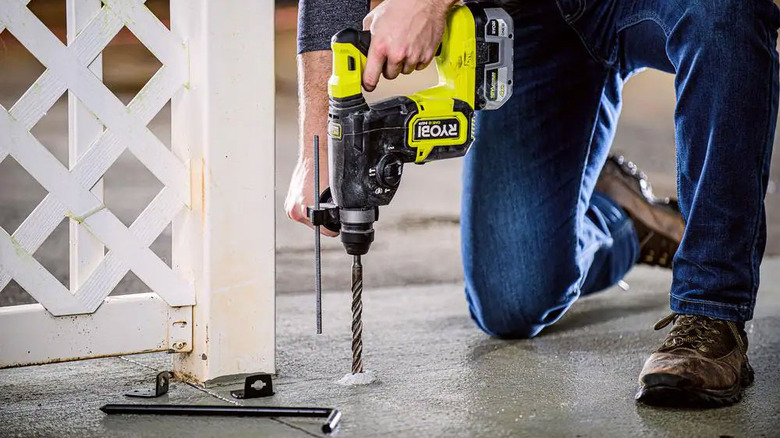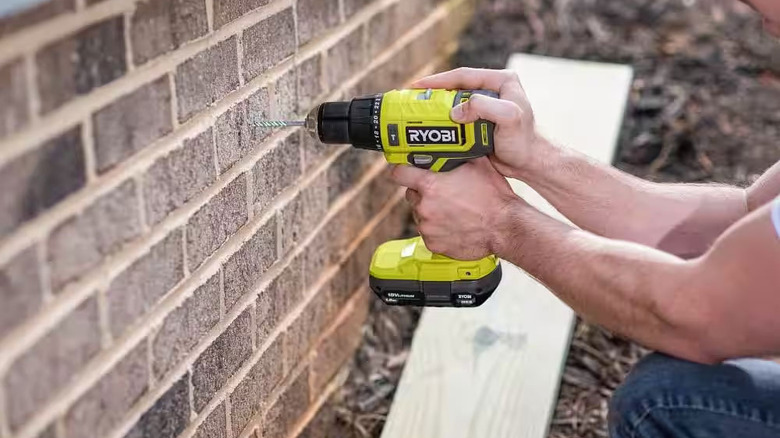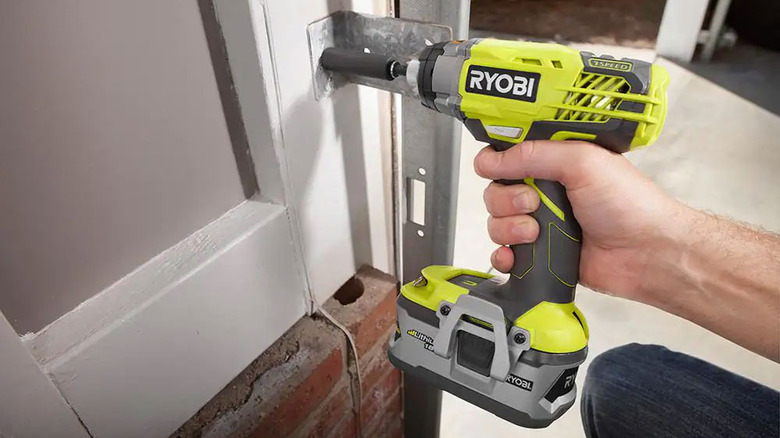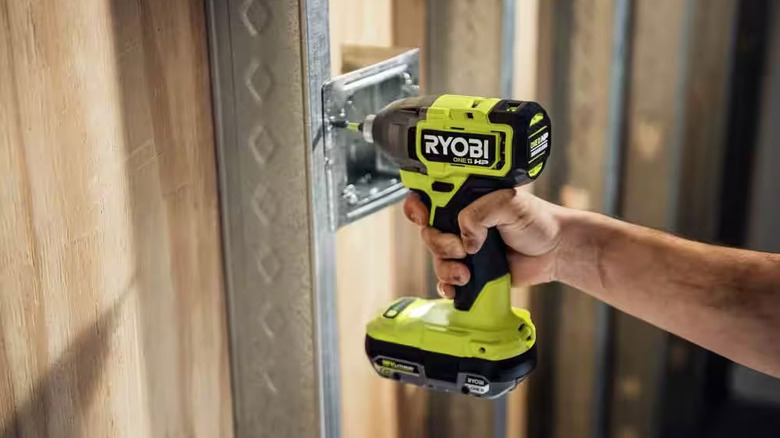Ryobi Hammer Drill Vs. Impact Driver: Which Power Tool Is Right For You?
The power drill or driver is one of the most useful things you can have in your toolkit, but there are variations on the typical power drill. Two such types of drills are the hammer drill and impact driver, but discerning the differences proves to be more difficult than one would think. After all, it's power tools, not rocket science.
Ultimately, while hammer drills and impact drivers have similar applications in the sense they both drive fasteners or drill into heavier-duty materials, they are not the same thing and have different applications.
Ryobi is a solid brand of power tools for DIYers and has a pretty extensive catalog of power drills. If you've been searching around for a new Ryobi drill that can handle more heavy-duty jobs but have no idea which model to get, knowing the differences between the two is helpful.
Initially, upon visual appearance, the first thing you'll notice is that Ryobi impact drivers are often smaller, lending themselves better for close-quarters woodworking like installing cabinets. Other than the way they look, there are also a lot of functional differences between the two tools. We'll be examining the tool-only versions of the drills for the sake of price comparisons. If you already own other Ryobi One+ power tools, you can swap out the same voltage batteries you use for other tools.
Hammer drill and impact driver differences
Impact drivers have a rotational impact mechanism that applies bursts of torque in the direction of the rotation, helping fasteners get through the material when it meets resistance. On the other hand, hammer drills use a back-and-forth pounding force in the direction that the bit is facing. This gives hammer drills additional power to drive through objects rather than increasing the speed of the rotation like an impact driver would.
But what does this functionally mean, and how do the differences dictate which tool to use? Impact drivers are good for driving long fasteners into hardwood or thick lumber, where a conventional power drill wouldn't be powerful enough. On the other hand, hammer drills are mostly used for drilling into even tougher materials like concrete and masonry, where an impact driver might struggle.
Though driving speeds for the hammer drill will generally be faster regardless of the material, the rotational effect of the impact driver makes prolonged use of the tool easier to handle because it produces less fatigue in your wrists and arms. Impact drivers may also be the better option when it comes to when it comes to fastening screws rather than drilling, as faster rotational speeds are better suited to catching the top of screws and other fasteners.
Lastly, it's important to note that because impact drivers use different chucks, they require hex-shank bits rather than the round-shank bits found in most drills.
Ryobi hammer drill options
The highest-rated Ryobi hammer drill is the ONE+ HP 18V Brushless Cordless 1 in. SDS-Plus Rotary Hammer, which costs $189 at The Home Depot. This is one of Ryobi's heavier-duty options and is suitable for larger jobs that require drilling or even breaking down stonework or concrete.
However, most will turn to the smaller and more affordable highest-rated hammer drill for Ryobi, the ONE+ HP 18V Brushless Cordless Compact 1/2 in. Hammer Drill for $106.27 at The Home Depot. The 18V Brushless Cordless Compact 1/2 in. Hammer Drill only weighs 2.5 pounds and can generate 400 in./lbs. of torque. The brushless version of the drill gets up to two times more runtime than the brushed version and is useful for drilling into concrete and brick.
The more affordable $79 ONE+ 18V Cordless 1/2 in. Hammer Drill at The Home Depot is also an option; it has 515 torque in./lbs. of torque, but unfortunately, it has a brushed motor, which is less energy-efficient and harder to maintain.
Of the positive reviews for both tools, users had a lot of good things to say about the drills working for projects that included materials like concrete and brick.
Ryobi impact driver options
The highest-rated Ryobi impact driver at The Home Depot is the ONE+ HP 18V Brushless Cordless 1/4 in. 4-Mode Impact Driver, which normally costs $119.99. This version comes with, as the name would imply, a brushless motor as well as a built-in LED light to help in dark places.
With 2200 in./lbs. of torque (torque will be higher for impact drivers because of the internal mechanism), the tool maintains a 4.7/5 rating and weighs 2.55 pounds. Users praised it for its ability to hold and drive screws without stripping them, as well as its light weight and useful LED light feature.
However, if you're on a budget, the $49 ONE+ 18V Cordless 3-Speed 1/4 in. Hex Impact Driver is a steal at The Home Depot. Though it is, unfortunately, a brushed motor, it's still a pretty powerful tool for the price.
A bit heavier than the brushless variation, at 2.75 pounds, the tool also comes with a handy LED light as well as three speed options, the top of which is capable of reaching 1800 in./lbs. of torque. The option you should get will highly depend on how often you plan on using the tool and the thickness of wood you'll normally need to drill into.
You should choose the tool that best suits your project
The tool for most people will largely come down to two key factors. The budget available for the tool and the actual project that needs to be completed. Generally, most people need to drill screws into wood or thin metal to secure things for basic home improvement, so there's a high chance that the Ryobi impact drivers will be the better option for basic home maintenance and simple DIY projects.
While the ONE+ HP 18V Brushless Cordless 1 in. SDS-Plus Rotary Hammer is one of the better-priced full rotary hammers that you can get; if you don't work with concrete, thick layers of wood, or masonry work, there's a likelihood it might be overkill for you.
The same can be said for the more affordable but less powerful models of both the Ryobi impact drivers and hammer drills. It comes down to how often you plan on using it and what materials you need to drill into. If you only plan on using the tool occasionally, the more affordable options will suffice.
However, if you have brick walls or a lot of concrete work around your house, getting a Ryobi hammer drill may save you money and hassle from renting or purchasing a more powerful piece of equipment should the need arise. Always remember to check reviews for the product you plan on getting, as the quality will depend on the model.
